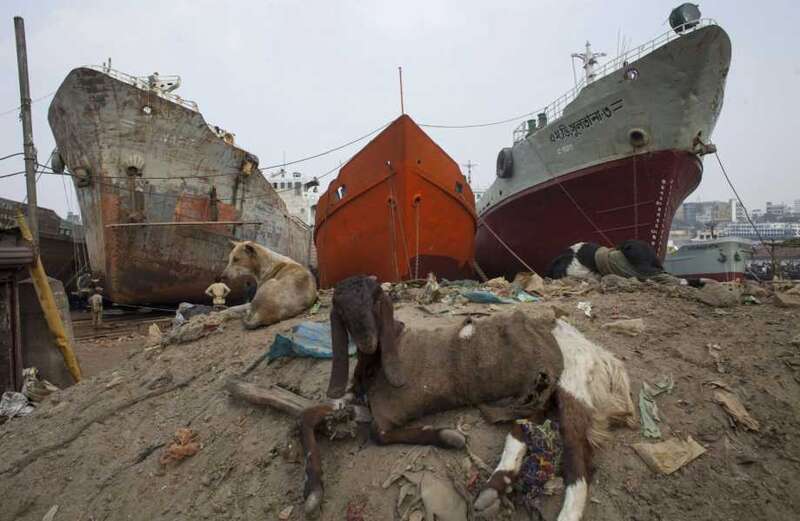SCATTERED along South Asia's coastline are the remnants of a chilling graveyard where the world's biggest ships go to die.
Apocalyptic scenes of 100,000-ton gutted hulls lay awash on tidal mudflats as shipbreakers dismantle them in perilous conditions.


India, Pakistan and Bangladesh are the mecca for this archaic trade - which has come under international criticism for human rights violations.
Giant vessels including bulk carriers and cruise ships are dumped on the shores as local firms pull them apart for lucrative scrap metal.
In 2019, a Sun investigation revealed more than 225,000 workers were exploited and forced to work in life-threatening environments.
 Secret way Tesco staff bag freebies & it’ll have you desperate to work there
Secret way Tesco staff bag freebies & it’ll have you desperate to work there
More than 10 per cent of that workforce was made up of children as young as eight.
The most notorious shipyards include Gaddani, Alang and Chittagong (Chattogram).
In the last three months, 98 ships have been sent to their grave - with more than 77 per cent of them arriving at one of those ports.
Advocacy group NGO Shipbreaking Platform has kept a close eye on the evolving situation.
Ingvild Jenssen, the founder and executive director, told The Sun the locations were 'cemeteries' for both ships and humans.
She said: "Vessels are built, maintained and repaired in dry-docks, that is also where they should be dismantled.
"Taking massive ships apart on tidal beaches as done in South Asia would never be allowed in the UK."
Doing so is a hazardous job due to the structural complexity of the unique vessels.
Accidents are commonly caused by fires, explosions, heavy objects falling and even electrocution.
In the last 50 years, thousands of men have lost their lives in the process due to minimal training or working with primitive gear.
 King Charles is hiring staff to work on banquets… but you need good taste
King Charles is hiring staff to work on banquets… but you need good taste
Workers reportedly break down the ships manually, usually with their bare hands, dismantling every sheet of metal bit by bit.
Not only are they exposed to asbestos and toxic fumes, but they risk being crushed to death by steel hulls and doors which fall on them from above.
In May, one Bangladeshi man died after falling to his death through a hollow hull.
However, incidents are rarely officially reported due to a lack of transparency on the part of employers and governments.
Ingvild said: "No ship owner can claim to be unaware of the dire conditions at the beaching yards, still they continue to sell their vessels to the worst yards to get the highest price for their ships.
"The harm caused by beaching is real.
"Workers risk their lives, suffer from exposure to toxins, and coastal ecosystems are devastated.
"Ship owners have a responsibility to sell to recycling yards that invest in their workers and environment."




Smashed, burnt and roasted bodies
Since 2019, EU law requires all ships registered to an EU nation must be scrapped in approved recycling shipyards – banning the use of the yards in the three notoriously dangerous nations.
However, campaigners fear some use loopholes to get around it.
Muhammed Ali Shahin, a program officer at Young Power in Social Action in Bangladesh, said: "In the last 20 years more than 1,000 workers have died.
"After watching those dead bodies, those smashed bodies, those burnt and roasted bodies, we are tired of it.
"We want environmental and human rights justice."
Most ships stay in service for around 25 years.
Ageing British and European passenger liners are often flogged to minor nations who refit, rename and reintroduce the ships to the oceans under different names.
To avoid directly selling to illegal shipyards, most other British ships – such as cargo ships and tankers – are simply sold to middlemen for the highest bid.
The scrap dealers, also known as cash buyers, are inherently linked to the unapproved yards.
They often change the ships’ flags and register them under new names in a bid to circumnavigate international maritime laws.
One European investigator who works with governments, trade unions and shipping companies across the world to improve standards told The Sun: "Just not enough is being done yet.
"It’s still too easy for cash-hungry British and European shipping owners to work around the rules.
"But it’s not enough to call for a complete boycott of shipyards in Bangladesh, India and Pakistan as thousands of men and their families depend on the work to survive.
"The onus is on governments and shipyard owners to get the facilities up to standard, provide life-saving safety equipment, train all workers properly and provide a humane environment for them to work in.
"Until that happens, the cash buyer and middlemen will continue to blight the industry."





